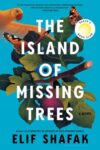
by Elif Shafak, 2021
Interesting book giving lots of history about the island of Cyprus, including the Civil War that erupted between Greeks and Turks on July 20, 1974. The main characters are Kostas, a young Greek man, and Dephne, a young Turkish woman. They live on the island and fall in love. They meet clandestinely at The Happy Fig, a charming tavern owned by Yusuf and Yiorgos, a Greek and a Turk, forbidden gay couple. A central character is the fig tree that grows in the middle of their tavern. The story is told by the Fig Tree, who is sentient. You learn about what happened to Kostas and Dephne in 1974, how they were separated for 25 years – he in London, she in Cyprus. How they got back together in the early 2000s, and left Cyprus with a twig of the dying Fig Tree, and went to London, planted the fig tree, and were blessed with their daughter, Ada.
It’s a good book, but a bit tedious. There are lots of secrets – people not telling each other things, when they really needed to spill their emotions. Also, not sure I like the idea of a sentient tree. The last chapter, you find out Dephne, who died of an overdose, entered the fig tree. I didn’t like Ada, the daughter. She is 16 when we meet her in class at school, where she has had an uncontrollable screaming session. One of her cruel classmates records it and it goes viral right before the Christmas break, at the same time a huge storm hits London. She’s supposed to be this empath, but she refuses to talk to her dad, Kostas, nor her Aunt Meryem, who arrives during Christmas break from Cyprus. Gradually, finally, they open up and the hurts of the past – mostly coming from the hatred between Greeks and Turks on Cyprus – are talked about.
There are a lot of science lessons relayed by the fig tree: about mosquitoes, mice, honey bees, ants, birds, trees.
I liked reading about the Flora and fauna of Cyprus. The beautiful villas and a hotel enjoyed by the rich and famous – a tropical paradise – all destroyed by the civil war.
One very sad thing they do is that they eat songbirds, catching over a million song birds each year, so cruelly. They put sticky glue on the trees and trap them. How awful! Kostas was a sensitive man and it broke his heart when his own mother was pickling songbirds to sell. He asked her to please stop. She did. I googled to see if the trapping of songbirds on Cyprus was still going on, and it is, as of 2016, unfortunately. They estimate a million and a half birds are trapped and killed every year. The dish is called “Ambelopoulia’ and it is a delicacy. It’s illegal but enforcement is lax. The trapping methods are exactly as she described, nets between Acacia trees, or glue on the branches. So sad!
Interesting book. She mentions Lawrence Durrell and something he wrote about Cyprus called Bitter Lemons. I requested it from the Library – Prospector. Wayne’s British tennis buddy, Richard, visits Cyprus where either his mother or his mother-in-law lives. The British controlled Cyprus in one form or another from 1878 to 1960, when Cyprus gained independence. Now, Britain has overseas territory on two islands near Cyprus: Akrotiri and Dhekelia.
This was the Old Town Library Book Club selection for the night of December 16th.